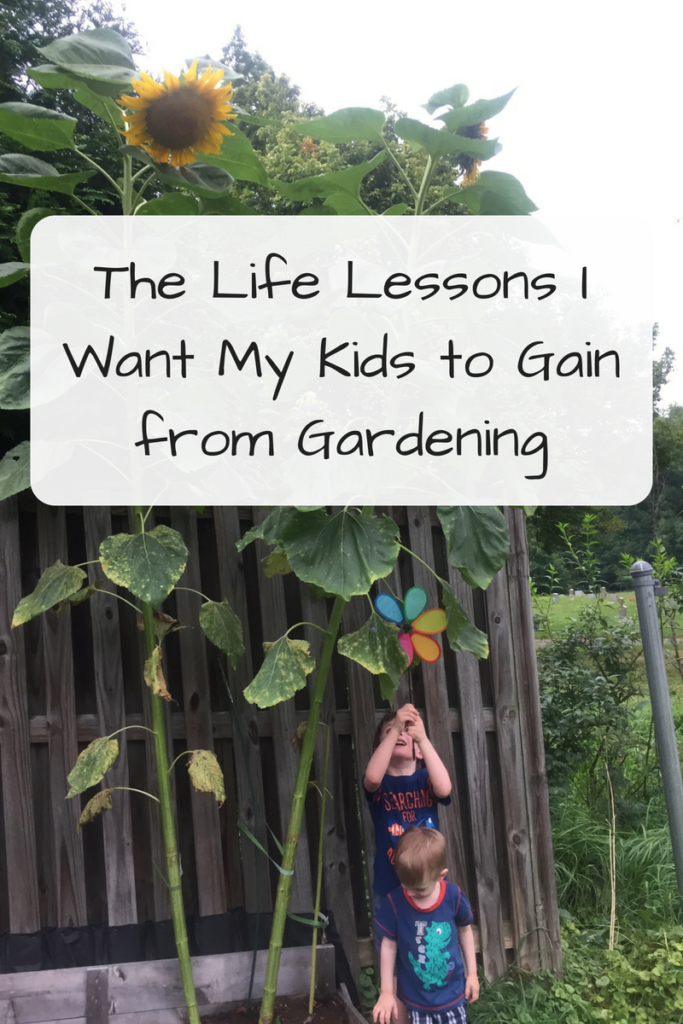
“Don’t walk – just stay there,” I told my two-year-old as he maneuvered around the wheelbarrow in our garden. Squish! His foot came right down on a squash vine. Oh well – there’s plenty more where that came from.
Even though my kids aren’t always gentle when it comes to my plants, they bring joy to my gardening. I think it benefits them too. Besides the health benefits, there’s a bunch of valuable life lessons I hope they pick up from our adventures in growing food.
Cultivate good soil
There’s a beautiful parenting meme going around that says you wouldn’t blame the flower if it doesn’t bloom. Instead, you fix its environment.
I try to live that out in our garden and the world. In our garden, I focus on building the soil more than anything else. Using a technique called lasagna gardening, I pile up layer upon layer of organic matter. Over the course of the year, the garden critters and microbes break it down into healthy dirt for the plants to draw nutrients from. I can’t change how my plants grow, but I can give them good soil to work with.
Likewise, we can’t expect to change the people around us. The best we can do is create the right circumstances for growth for ourselves and others. If we don’t get the right nutrients, enough water, and rest, we’ll be more prone to sickness and stunted growth. If we feed ourselves and people around us with kindness and encouragement, it’s more likely that we’ll all develop well.
Focus more on embracing the right things than keeping out the wrong ones
Some people spend most of their gardening hours weeding. Our garden is far from weed-free, but I don’t worry too much about it. Because of the soil, our garden plants are usually strong enough to compete with the weeds for space, sun and water. Instead, I focus on planting plants that “get along.” Using companion planting, I group plants together that build on each other’s strengths. The Native American Three Sisters combination of beans, corn, and squash is one of those a classic combinations.
In life, I hope my kids find ways to build bridges and connections with others. I want them to find and trust people who support them, rather than shying away from people in fear. There may be times that they need to remove people from their lives who are being downright abusive, but that’s not where they should focus their energy.
Know that some things can be good or bad, depending on the situation
As I was weeding the other day, I was explaining to my five-year-old about the role weeds play in ecosystems. Rather than being pests, they’re pioneer plants. In ravaged environments, they burst forth with life. Where floods have swept away all the soil or fire has wiped out other plants, they’re the first on the scene. Their roots break through rocks and make the dirt easier for other plants to root themselves. But as I concluded, “I still don’t want them in our garden.” It’s simply the wrong place for them.
So it is with so much in life. There are things that are fine in moderation or at certain times – wine, goofy jokes, spraying whipped cream right into your mouth – but totally inappropriate or harmful in others. Understanding what is useful and good for one situation or person and not for another is a huge part of developing good judgment.
Roll with what sprouts
Every year, we get some plants in our garden that either reseeded themselves or planted themselves from seeds in the compost. Tomatoes and melons are particularly entrepreneurial. And every year, I go, “Huh, I don’t remember planting that there” and then let it keep growing. We’ve gotten lots of delicious produce this way.
Sometimes, life will present you with opportunities you would have never anticipated. Welcome them with open arms.
Anticipate failure
I always plant many more seeds than I ever expect to sprout, much less than I expect to reach full growth. I know a certain number of my efforts won’t be successful. Most importantly, I’m okay with that.
We need to face up to the fact that we will, at some point, fail. Without that acknowledgement, we can’t truly embrace risks. Planting seeds, whether physical or metaphorical, is always an act of faith.
A little mess never hurt anyone
Every year, our garden is a bit of a disaster area. I always plant too much, vines grow all over the place, and the deer who live in the nearby cemetery jump in the fence. Despite that, we still get lots of produce for minimal effort. Some plants – like tomatoes – are inherently a bit messy. Others just require more effort to look perfect than I’m willing to put in. They still taste good.
Living and loving is never a lean-cut, obvious process. Growing up is full of backwards steps, unseen risks, and mistakes. But without them, we’d never have any growth.
Even if my kids don’t remember a single thing I taught them about plants, I hope they remember the bigger lessons about life.
For more on sustainable living, be sure to join our Green and Sustainable Parenting Facebook group!
Want to participate in our Family Kindness Challenge? Sign up for our newsletter and get five days of activities to do with your kids that help teach kindness, tolerance, and empathy.